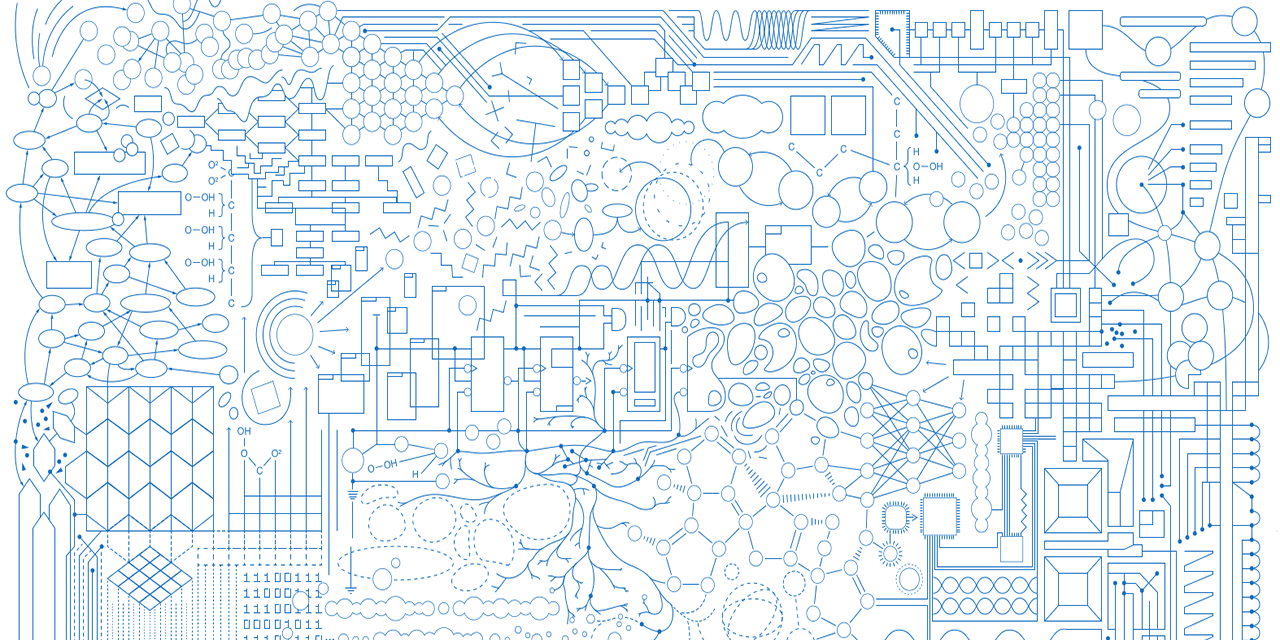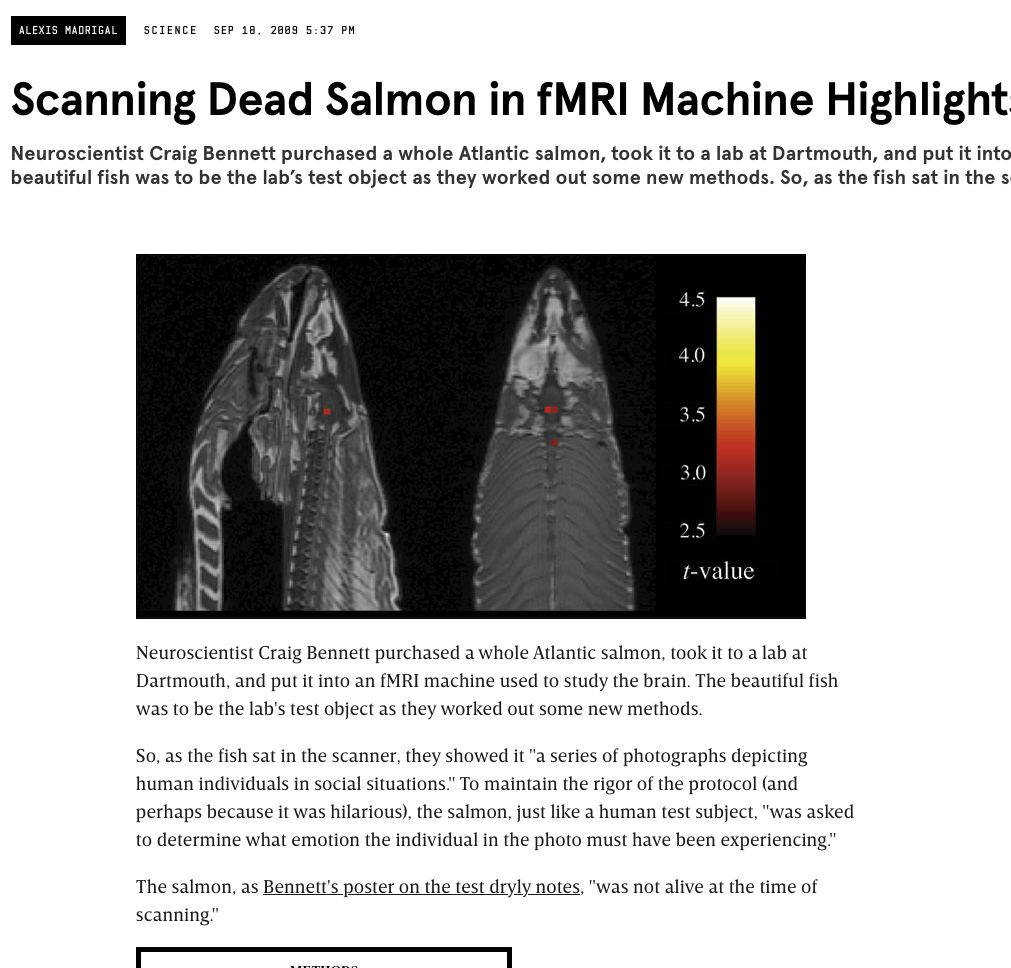Directors Gabriele Gramelsberger and Stefan Böschen explain the first two years of c:o/re in new interview with BMBF
Since May 2021, c:o/re has been dedicated to investigating research cultures: their similarities, differences and transformations. It examines how research is changing due to the scientific re-orientation towards complex systems and as a result of societal challenges. Gabriele Gramelsberger and Stefan Böschen discuss the Centre’s work this with the BMBF in this recent interview.
Models of complex systems as scientific-public boundary objects: The case of climate change. Complexity and Transdisciplinarity Graduate School of the Center for Advanced Studies (Aix-Marseille University), February 27-28
On February 27-28, 2023, the Complexity and Transdisciplinarity Graduate School of the Center for Advanced Studies (IMéRA), Aix-Marseille University is hosting an event on “Models of complex systems as scientific-public boundary objects. The case of climate change“, organized by Gabriele Gramelsberger and Alexandre Hocquet (Lorraine University, c:o/re alumni). To register, kindly contact Solenne Bruhl (solenne.BRUHL@univ-amu.fr). The event will feature the following talks:
27.2.2023, 14-16h Complex systems, climate modeling and managing of uncertainties – Managing the complexity of knowledge production
Gabriele Gramelsberger
28.2.2023, 10-12h Community models, standards and platforms: Managing the complexity of global collaboration and policy
Gabriele Gramelsberger
28.2.2023, 14-16h Research software: Managing the complexity of collaborative programming
Gabriele Gramelsberger & Alexandre Hocquet
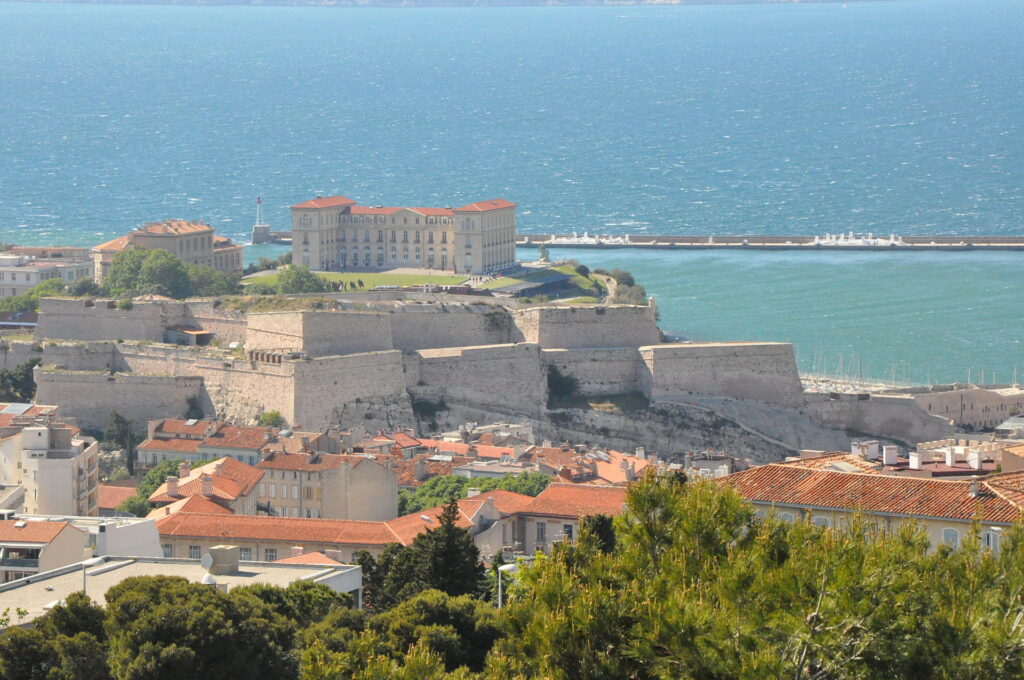
Talk by Stefan Böschen at the Austrian Academy of Sciences: Engineering turn? The shift in research cultures as a challenge for science research
On Tuesday, March 28, Stefan Böschen is presenting the work of c:o/re at the Institute for Technology Assessment at the Austrian Academy of Sciences. You can find the abstract and practical information on how to register on the website of the Institute for Technology Assessment, here.
Torsten H. Voigt on voodoo science, dead salmons and the Human Brain
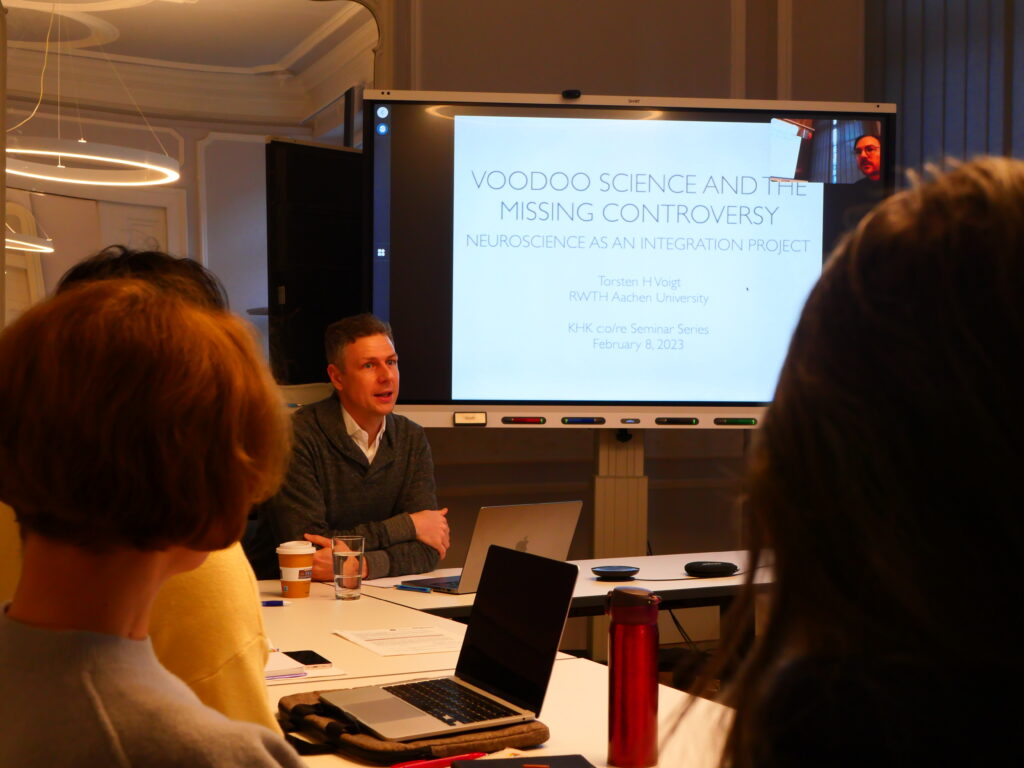
On February 7, Professor Torsten H. Voigt, the Dean of the Faculty of Arts and Humanities at RWTH Aachen University, delivered a talk in the c:o/re lecture series on what has been referred to as “Voodoo science” . Professor Voigt argued that, as in science and philosophy in general, controversy functions as a driver for advancement and innovation in neuroscience. However, he explained, neuroscience as a discipline and community exhibits instrumental rationality in managing and avoiding meaningful controversy. This led to what may be termed an eclipse of reason, damaging or even destroying progress in the scientific field.
Neuroscience is enjoying great popularity, both within academia and in pop culture. and popular science. During the 1980s neuroscience cognitive became the new science of mind, by having incorporated molecular biology. This resulted in a study on a molecular level of how we think, feel and learn. Seen in this way, advertising of consumer goods, for example, reflects a connection established in pop culture between human capacities for creativity and the brain organ. These construals are not only employed in somewhat amusing ways in advertising, but they point to an unjustified optimism in academia. One reason for which this may be allowed, but which also raises suspicions about neuroscientific methods, might have to do with the very low reproducibility herein.
An important example that illustrates this type of process leading to an eclipse of reason, as Voigt argues, is observed in how the otherwise noted study by Vul et al. (2009) was largely ignored in neuroscientific research. The reluctance regarding this study was arguably met with from the start is suggested by the respective journal’s editorial board recommnending removing the expression “voodoo correlatons” from the title of the paper, as initially proposed by the authors.
Vul et al. (2009) observe mysteriously high correlations are claimed in neuroscientific research. This is explained by the fact that many experiments looked at a specific brain region instead of the whole brain as such in relation to behaviour. Despite drawing attention, the study has been ignored (low number of citations) by the community of neuroscientific researchers.
A prototype for signaling controversial matters in neuroscience, setting the tone of doing so in a controversial manner, is the famous “dead salmon” paper by Bennett et al. (2009), who ironically criticised neuroscientific methods by claiming correlations by observing supposed neural activity through fMRI in a dead salmon. The salmon, which “was not alive at the time of scanning”, “was shown a series of photographs depicting individuals in social situations with a specified emotional valence.” As neural activity could arguably be noticed in the image resulting from the scanning, the authors ironically claimed neural correlates of interspecies perspective taking”.
Another example that displays the eclipse of reason tendencies in neuroscience regards the Human Brain project, massively funded by the European Union. Arguably, the Human Brain project is not so much about the brain, as much as it turned out to be an IT infrastructure development project (Nature 2015). With such an example in mind, Voigt construes neuroscience, broadly, as an integration project
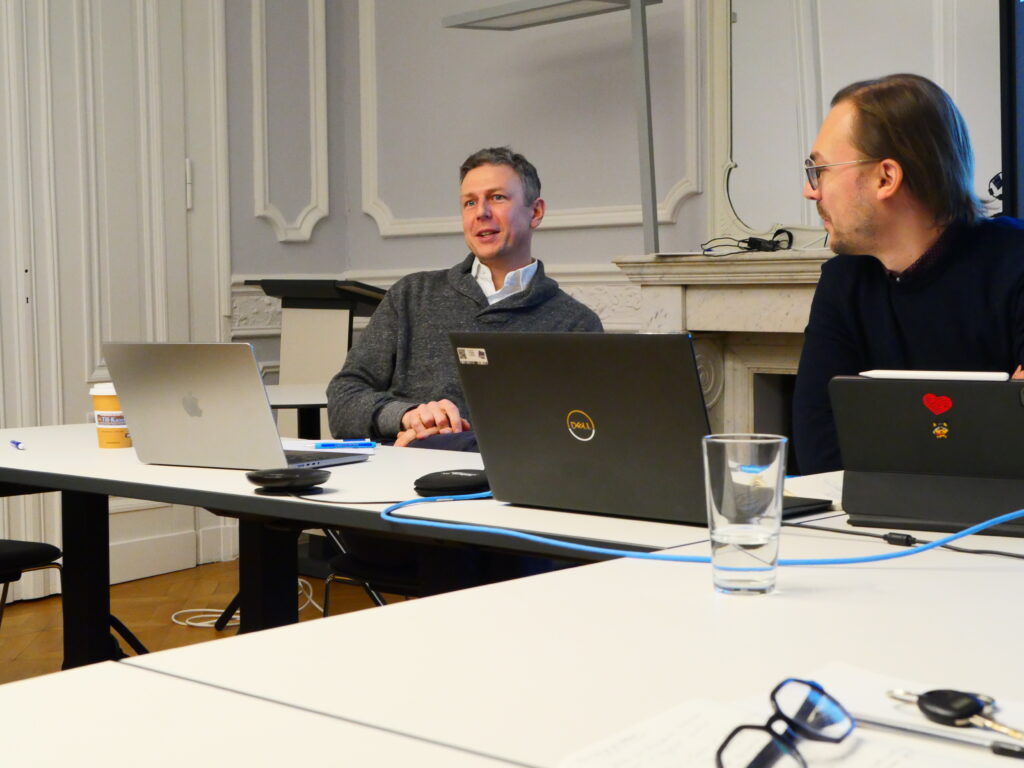
References
Vul, E., Harris, C., Winkielman, P., Pashler, H. 2009. Puzzlingly High Correlations in fMRI Studies of Emotion, Personality, and Social Cognition. Perspect. Pychol. Sci. 4(3):274-90.
Rethinking the brain. 2015. Nature 519, 389. https://doi.org/10.1038/519389a
Bennett, C.M., Miller, M.B., Wolford, G.L. 2009. Neural correlates of interspecies perspective taking in the post-mortem Atlantic Salmon: an argument for multiple comparisons correction. NeuroImage, 47, S125.
Politics of the Machines: Lifelikeness & beyond
Call for Track-Topics and Formats
Deadline Call for Track-Topics and Formats: 01 April 2023 New Deadline: 16th April 2023
The Call for Papers will follow after the Call for Track-Topics has closed.
_______________
The 4th POM Conference
Lifelikeness & beyond
RWTH Aachen University
KäteHamburger Kolleg:
Cultures of Research (c:o/re).
April 22-26, 2024
Life is in crisis. In society, this crisis has generated an uncertainty entangled with environmental injustices, health emergencies and the many faces of right-wing movements around the world – to mention some examples. Uncertainty might blurry the future and our capacity to make decisions, but it also opens up a space of possibilities. In this fragmented framework a new field for contingencies emerges. If we are unsure about what might be, alternative but unstable scenarios become possible. How does society react to those alternative scenarios? How are scientific and artistic communities responding to the various contingencies of the present?
In the wake of this era, we have been witnessing, in biomolecular research, the developments of programmable biosensors, synthetic biology and diverse biological entities that are aimed to be made programmable. These advancements amount to the crisis of life. These new phenomena in life-research have, for example, transformed the way in which we think about organisms and how life has evolved and transformed on earth.
At the same time, the fields of life-like robotics and computational evolution, which produce artificial entities modeled after living organisms – like self-reproductive algorithms and artificial neural networks – have brought to light questions regarding the qualities defining what is life at all. Life is being redefined by the parameters of its artificial models, so we are forced to rethink the question: what is the logic of living? The borders between machines and biological systems are being negotiated across the sciences and the arts at large, and novel questions and modes of thinking are emerging from these ontological reorganizations. Faced with these situations, one cannot help pondering on the limits of the possible and the limits of life.
Nowadays, machines can perform as agents that respond to contingent scenarios, they act as if they were alive. If life enters the space of formal logic and probability, if it is modeled, engineered and designed, does it follow the laws of logical inference? It is not only the difference between the organic and the inorganic that gets blurry, but also the one between the natural and the animated as well as the boundaries between necessity and contingency. What kind of models of contingency can be brought about that are helpful to respond to the crisis of life? What must technologies and artistic practices that cooperate with the living look like? How does this change life itself?
In our times, social ecologies are steered following automated systems and models. Images of what the future of a warming planet might be are at the center of political decisions, and bodies in the street are demanding accountability to those who have been taking those decisions. What is the motivation for caring for life? Computational systems have become the basis for decisions on which forms of life are worth preserving, which ones have the right to have rights – as Hannah Arendt would put it – and what forms of life are purposeful to maintain and support. The care for life is found between environmental reactionary views on nature as the origin of place-based identities, and questions of locality and global solidarity; from colonialism to racial and economic justice. How can these models serve to respond to the needs of social groups, communities and the collective?
What effect has data on decisions on what lives we care for? On the one hand, biotechnology opens up spaces of possibility, on the other hand, it also holds the danger of new forms of control, which may be utilized in nation-state politics, for example, in the form of border control biometric technologies. Automated decisions are made over life and death in zones of war. Personal data is stored to keep the metabolic networks of capital flowing. Data is, however, at the same time, used for feminist aims and as a tool to identify urban spaces where harm and death are a threat. Communication technologies have shown to be crucial for marginalized groups for creating networks of care, support and self-defense. Thus, it seems that the same technological shifts that seem to serve necropolitical aims are the ones bringing about new forms of the collective.
With the overarching theme “Lifelikeness & Beyond” the Politics of the Machines conference organized by Käte Hamburger Kolleg: Cultures of Research at Aachen University seeks to bring together researchers and practitioners from a wide range of fields across the sciences, technology and the arts to develop imaginaries for possibilities that are still to be realized and new ideas of what the contingency of life is. The call also seeks to question what the limits between reality, fiction and imagination can be when we look for sources of action or new forms of collective action and of creating collectivities. What kind of imaginaries are needed to think of new forms of research and practice that effectively act as a counterbalance to the many crises of the present? What can we learn from a performed contingency about the community of the living and the non-living? How is the idea of contingency transformed when life and non-life are embedded within each other? PoM Aachen welcomes proposals for conference sub-tracks that look into transdisciplinary research at large in creating unrealized futures.
Full Call for Tracks and Submission: https://www.pomconference.org/pom-aachen-2024/
Upcoming Workshop: Turning Points in Reflections on Science and Technology. Toward Historicizing STS
On March 14-15, 2023 the c:o/re workshop Turning Points in Reflections on Science and Technology: Towards Historicizing STS will take place. The workshop focuses on the 20th and 21st Century intellectual history of science and technology. It aims at opening up the field by historicizing Science and Technology Studies from various historical turns. Furthermore, it aims at discussing the various notions of “historicizing STS”. The Program is available below and here:
Coming up: Lecture Series on Complexity
The summer term’s c:o/re Lecture Series will focus on the topic of complexity. But what is complexity? The Encyclopedia Britannica explains complexity as “a scientific theory which asserts that some systems display behavioral phenomena that are completely inexplicable by any conventional analysis of the systems’ constituent parts” – but since understanding and explaining the world is what research basically aims at, do we have reached the limits of what we can know when it comes to complex systems?
The talks of this summer term’s lecture series will touch on complexity from different disciplinary perspectives. Our invited speakers are: Giora Hon of Haifa University, Jan C. Schmidt of Darmstadt University of Applied Sciences, Benjamin Peters of University of Tulsa, Klaus Mainzer of Technical University of Munich, interdisciplinary researcher Clarissa Lee at c:o/re, Kyveli Mavrokordopoulou of the Centre Georg Simmel, and the historian and philosopher of natural philosophy and modern science Arianna Borelli.
Navigating Interdisciplinarity: between over-simplifying and over-complexifying
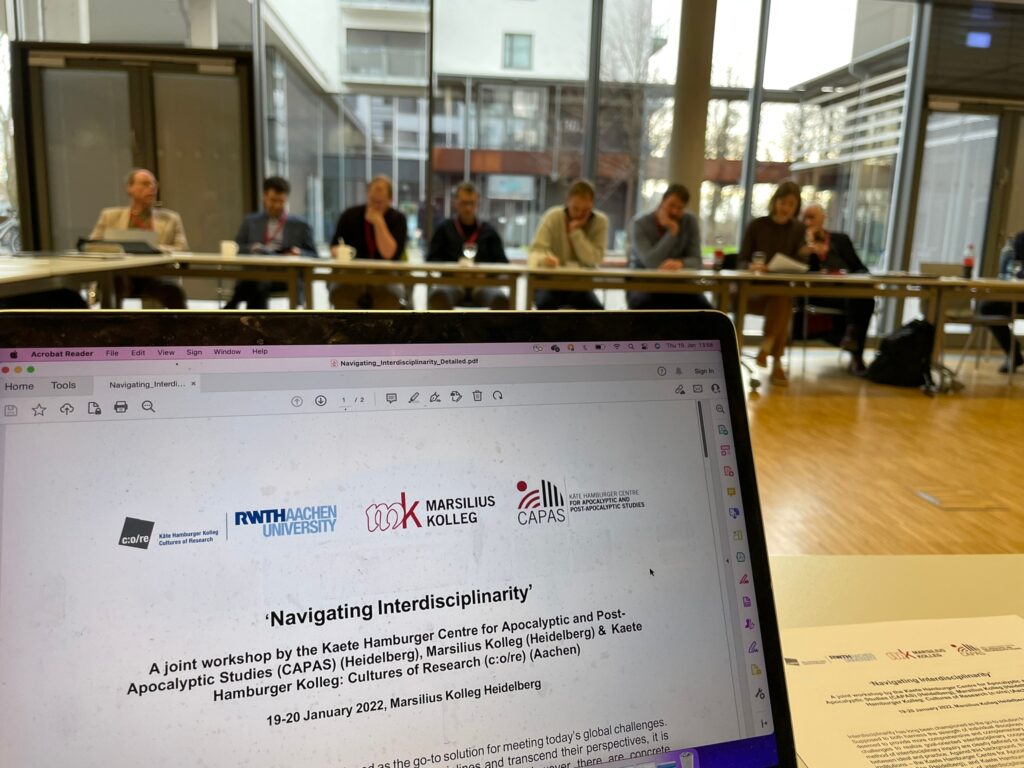
On January 19-20 the workshop Navigating Interdisciplinarity hosted at the Marsilius Kolleg Heidelberg and organized in collaboration with CAPAS and c:o/re took place. This event brought together interdisciplinary groups of researchers, mostly but not only from the humanities and social sciences, to discuss the complexity of challenges that academic interdisciplinarity poses.
The workshop took off with a discussion on metaphors of interdisciplinarity, the metaphors that may give insight for thinking on interdisciplinarity to researchers from various fields.
Guided through a format well-designed by the organizers, the participants reflected and conversed on the notions of complexity, security and collapse. The debates revolved around the question of whether these notions can be vehicles for inter- and/or trans-disciplinarity? In some of the debate groups in the workshop it appears that systems theory is a reoccurring theme as a possibly encompassing framework for interdisciplinarity. In this we see both possibilities to foster interdisciplinarity as well as a shared disciplinary bias.
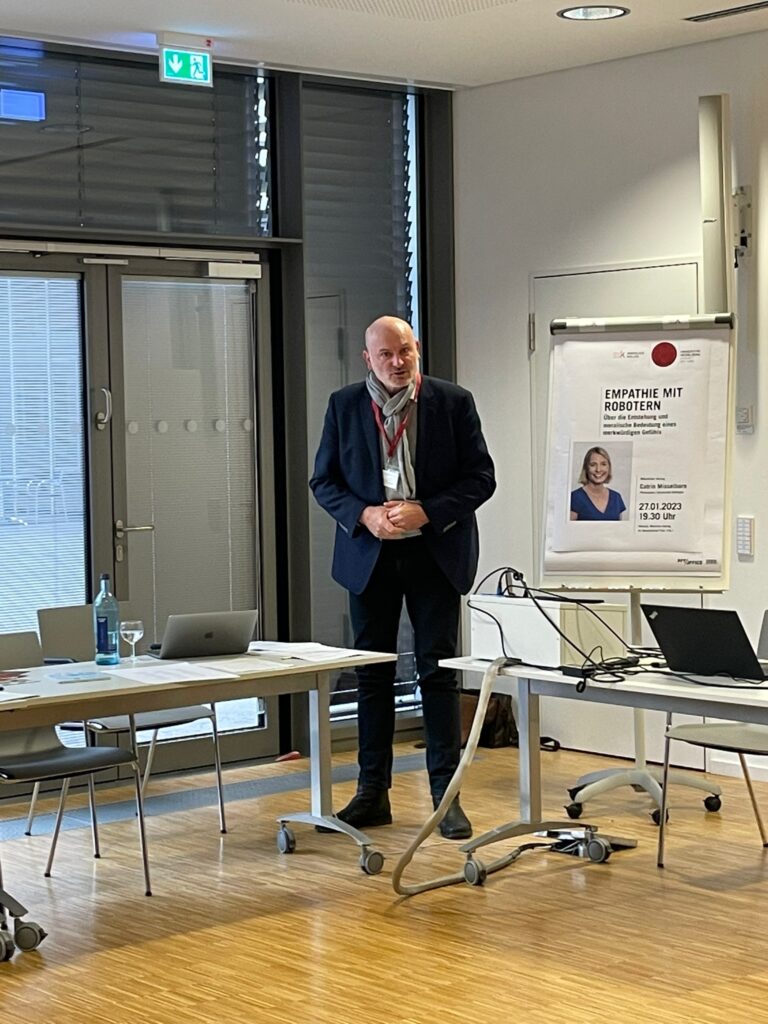
Discussions on complexity also seem to draw on notions of models and modeling. The clarity and understanding that models may provide bear on complexity. The work of models is to simplify, so to make comprehensible complex matters. As such, an important consideration in modeling consists in the parameters within a model is rendered insightful to what it models. How much to simplify, how much complexity to retain?
To further ponder on (possibilities of) transfer between disciplines, the participants discussed, in groups, three triads of overarching concerns about knowledge production, namely: (1) Validity – Evidence – Justification; (2) Coherence – Narration – Causation; (3) Argument – Explanation – Rigor.
Security appears to be a difficult but nevertheless useful concept to employ as a notion to breach disciplinary boundaries. Discussions in this regard seem to offer epistemologically open approaches on research in terms of a trade-off between low risk & low gain and, respectively, high risk and high gain.
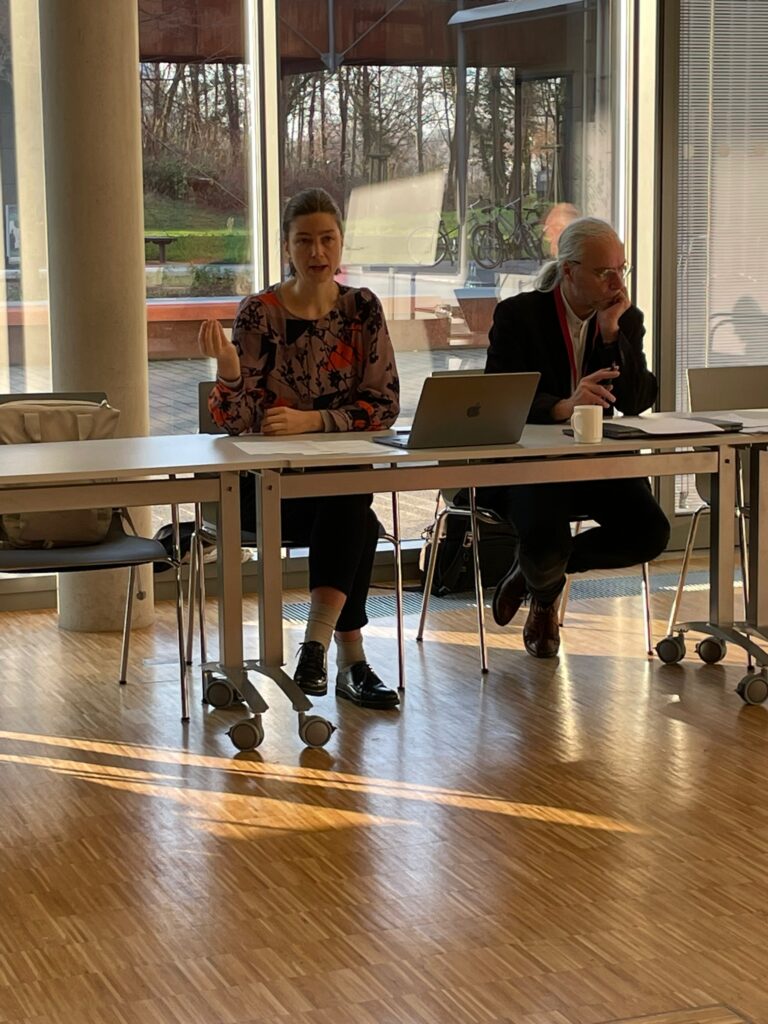
As a notion, collapse seems to stir interest for interdisciplinary perspectives. It is difficult to start work from the concept of collapse but we find ourselves in the situation of having to start from a collapsing context. Collapse, that is, things falling into each other may cause discomfort but while opening opportunities. It may produce insecurity and it tends to consist in a reduction of complexity.
We would like to thank our colleagues from Marsilius Kolleg Heidelberg and CAPAS for this interesting event and look forward to continuing the collaboration by organizing follow-up events as well as starting to draft papers on the themes discussed.
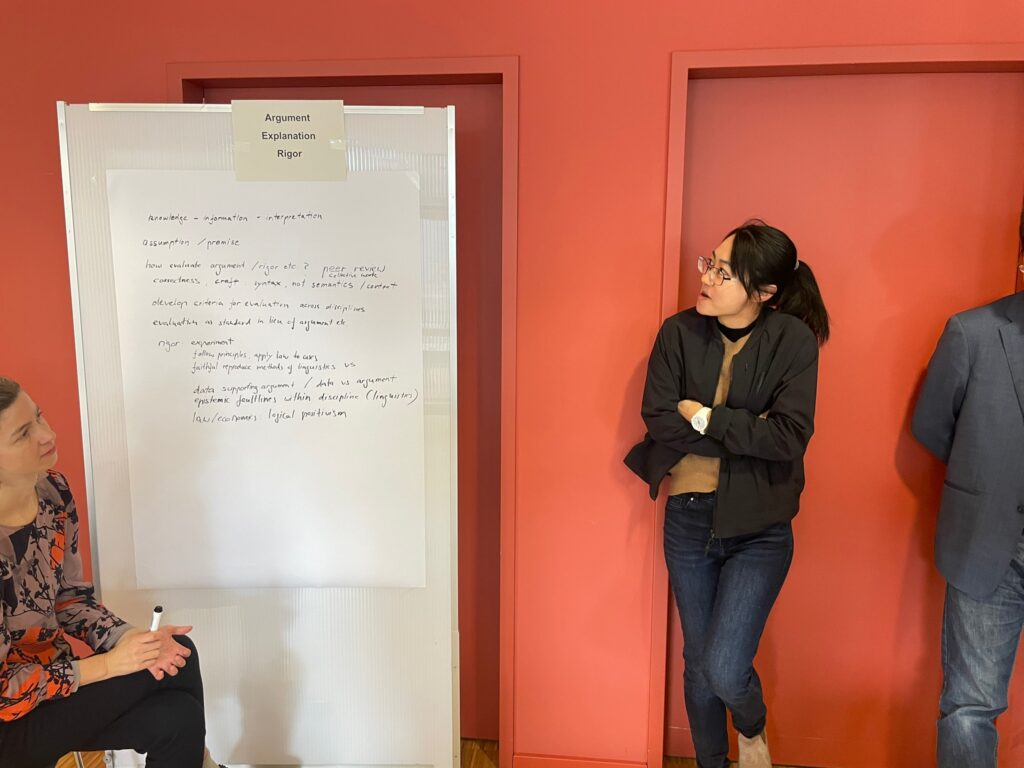
Varieties of science, 1: Patterns of knowledge
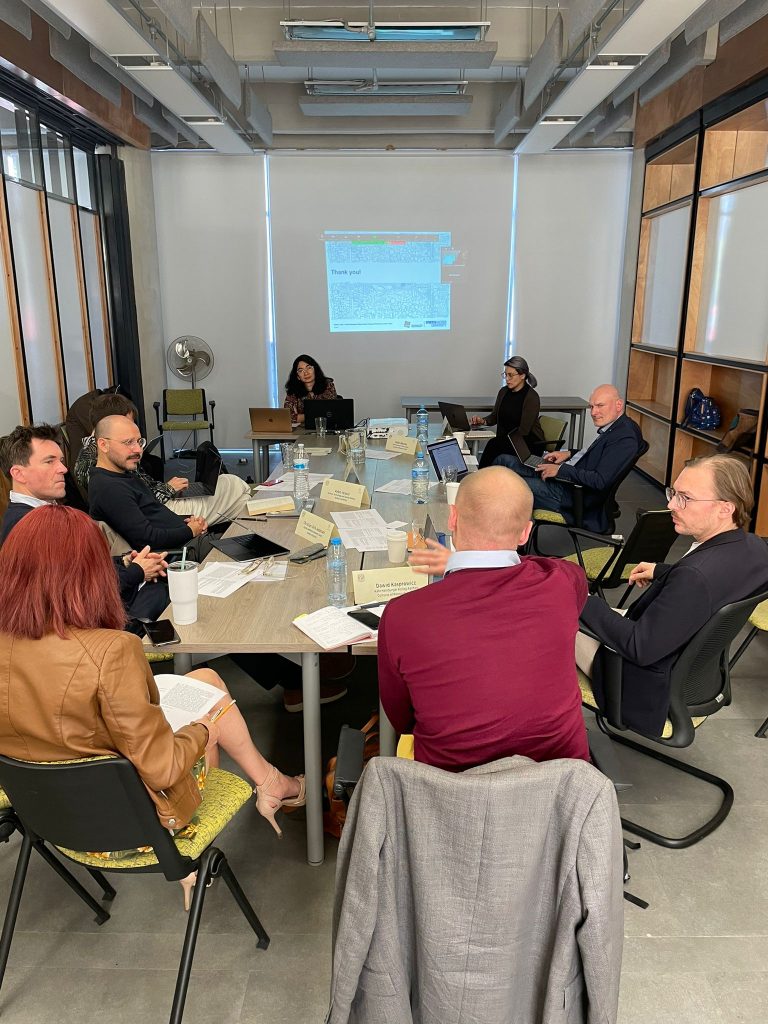
Technology“, at UNAM
On December 5th and 6th the first Varieties of Science workshop, titled Patterns of Knowledge, took place at the National Autonomous University of Mexico (UNAM). Varieties of Science is a series of workshops, organized by c:o/re, that aims to explores the pluralities of knowledge production. The workshop Patterns of knowledge brought together scholars from c:o/re, the hosting university in Mexico City as well as the Science, Technology and Society Studies Centre and the Digital Aesthetics Research Center of Aarhus University. We would like to thank Miriam Peña and Francisco Barrón of UNAM for hosting this. The event was live streamed on the YouTube channel of the Seminario Tecnologías Filosóficas, where it can be watched. We will soon post a full report of this event.
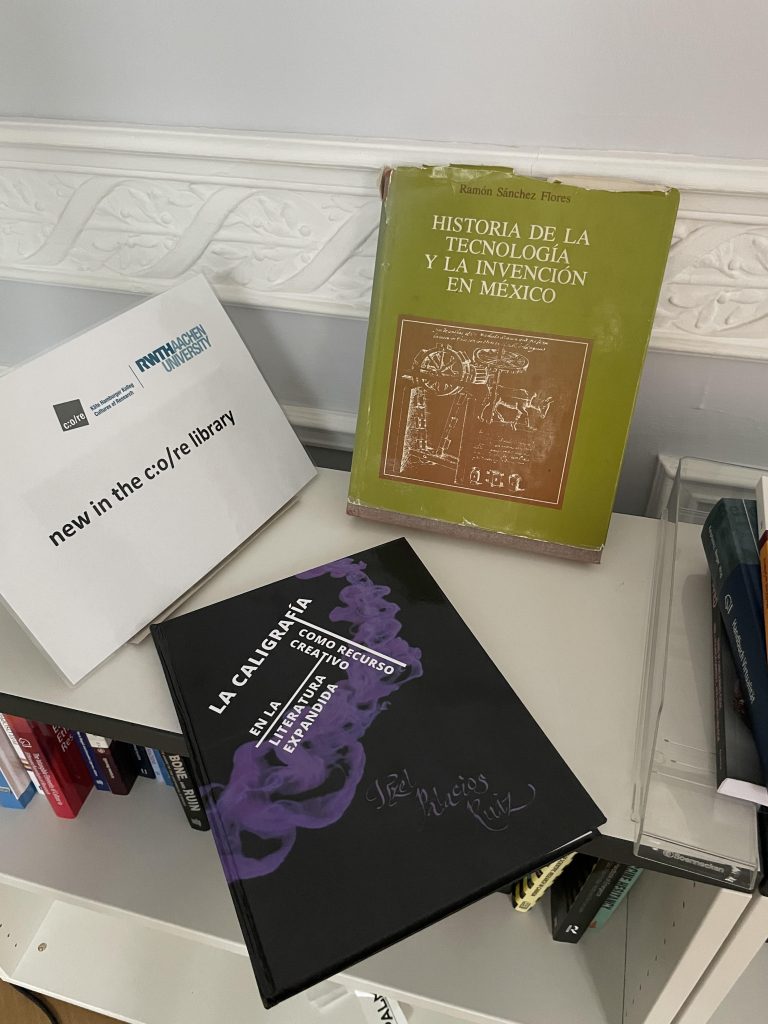
Fernando Pasquini’s proposal for an ergonomics of data science practices
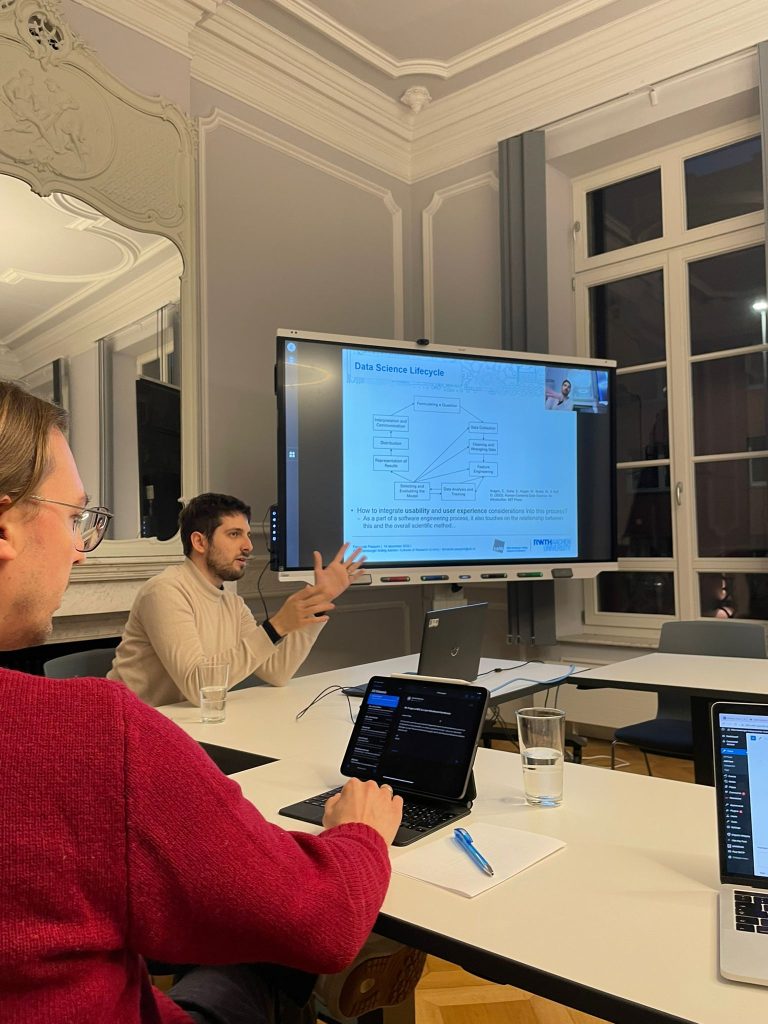
On December 14, 2022, c:o/re fellow Fernando Pasquini Santos explained his proposal Towards an ergonomics of data science practices, as part of the 2022/2023 c:o/re lecture series. While he acknowledged that the term is arguably outdated, Pasquini developed a broadly encompassing notion of ergonomics, spanning across modalities and modes of human-computer interaction. In this endeavour, Pasquini started by asking “how does it feel to work with data?” Tackling the question, he distinguished between challenges and directions in technology usability assessments.
In what was a rich and broadly encompassing study, Pasquini found particular inspiration in Coeckelbergh (2019), who notices a tradition in philosophy of technology that equates skilful acting with having a good life.
In this light, Pasquini proposed a “critical mediality” perspective in data science, that covers considerations from abstraction in data work to mathematical constructivism, embodiment and to blackboxing.
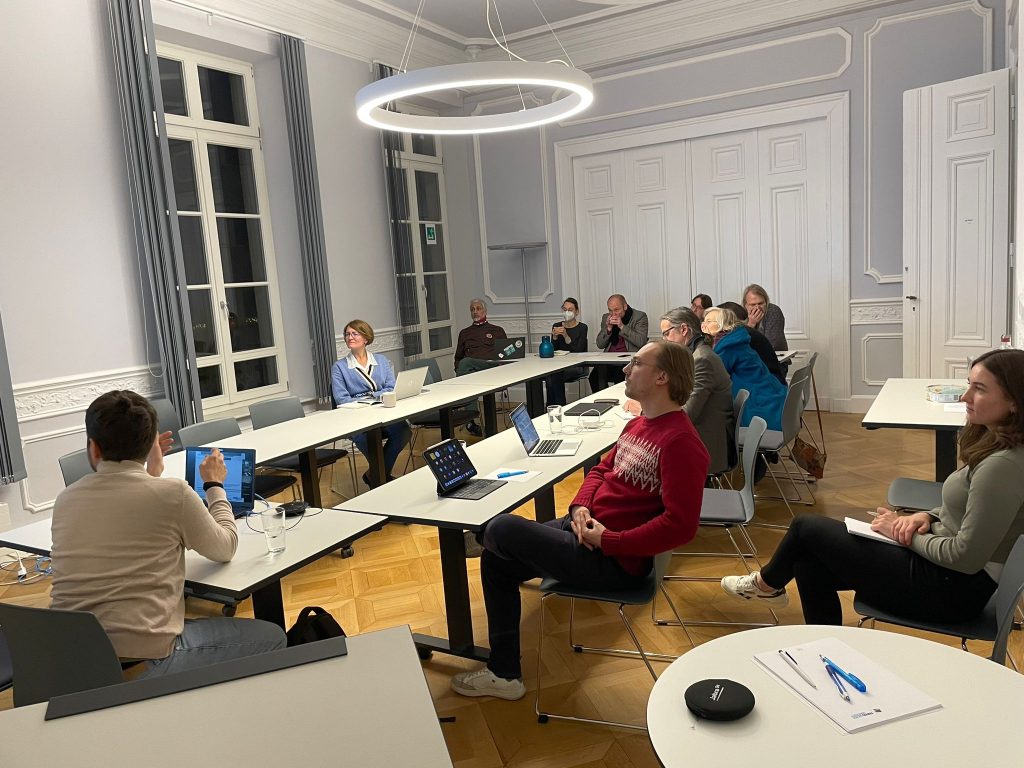
References
Coeckelbergh, Mark. 2019. Technology as Skill and Actvity:Revisitng the Problem of Alienation. Techné: Research in Philosophy and Technology 16(3): 208–230.

